University of Wisconsin–Stevens Point
The University of Wisconsin–Stevens Point (UW–Stevens Point or UWSP) is a public university in Stevens Point, Wisconsin. Established in 1894, it is part of the University of Wisconsin System. UW-Stevens Point grants associate, baccalaureate, and master's degrees, as well as doctoral degrees in audiology, educational sustainability, and physical therapy. In 2018, UW-Stevens Point merged with UW-Stevens Point at Wausau and UW-Stevens Point at Marshfield. The 406-acre (164 ha) main campus includes the 280-acre (113 ha) Schmeeckle Reserve on the north side of the Campus. There are 15 academic buildings, and 13 Residence Halls.[2]
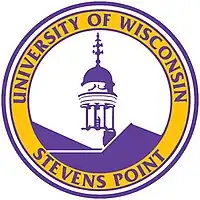 | |
| Type | Public university |
|---|---|
| Established | 1894 |
Parent institution | University of Wisconsin System |
| Accreditation | HLC |
| Chancellor | Thomas Gibson |
Academic staff | 450 |
| Students | 7,725 |
| Location | , U.S. 44°31′30″N 89°34′05″W |
| Campus | Urban, 406 acres (164 ha) |
| Colors | Purple and gold[1] |
| Nickname | Pointers |
Sporting affiliations | NCAA Division III – WIAC |
| Mascot | Stevie Pointer |
| Website | www |
 | |
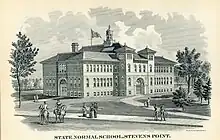
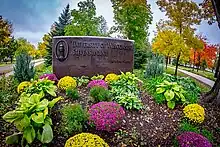
UW-Stevens Point is organized into four colleges with more than 120 undergraduate programs in 48 majors and 78 minors and 17 graduate programs.[3][4] In 1902, UW-Stevens Point became one of the first schools in the country to educate young women in “domestic science” or home economics.[5] In addition, UW-Stevens Point was the first in the nation to offer an environmental-conservation major.[5]
History
After securing land and funding from the City of Stevens Point and Portage County and winning the right to host the new normal school, Stevens Point Normal School opened on September 17, 1894, with 201 students.[6] In addition to teacher preparation, "domestic science" (home economics) and conservation education were offered; the latter formed the basis for the College of Natural Resources.
In 1927, Stevens Point Normal School became Central State Teachers College and began offering four-year teaching degrees. When post-World War II enrollment became less centered on teacher training and more focused on liberal arts education, the Wisconsin State Legislature intervened, changing the school's name to Wisconsin State College–Stevens Point with the authority to grant bachelor's degrees in liberal arts.[7]
In 1940, William C. Hansen began his 22-year tenure as the institution's longest-serving president.[8] Ever larger numbers of students in the 1950s and 1960s led to construction on campus throughout the 1960s and early 1970s. It was during this period, in 1964, that the college was elevated to university status as Wisconsin State University–Stevens Point and began offering graduate degrees.[9] Seven years later, the Wisconsin State Universities merged into the University of Wisconsin system, and the school adopted its current name.[9] UW-Stevens Point has more than 77,000 alumni. More than half of these alumni live in Wisconsin. In 1968, UW-Stevens Point formed the Northwoods battalion, an ROTC unit for the United States Army. [7]
Lee S. Dreyfus became chancellor in 1974 before becoming Wisconsin's 40th governor. Governor Dreyfus was inaugurated on the lawn in front of Old Main on the UW-Stevens Point campus in 1979.[9]
In 2007, a sustainability task force was created to help achieve the future goal of a carbon neutral campus.
In 2009, Chancellor Linda Bunnell resigned after a student vote of no-confidence.[10] The vote in part was called because of an automobile accident she failed to report and allegations of drunken driving.[11] Bernie Patterson was chancellor from July 2010 till December 2020.[12] Thomas Gibson became the 15th chancellor of the University of Wisconsin-Stevens Point on January 11, 2021.[13]
The campus hosted the Jacksonville Jaguars of the National Football League for their first training camp in 1995. It was part of what then was known as the Cheese League, a collection of teams that conducted training camp in Wisconsin. Since 1996, the Jaguars have conducted their training camp in Jacksonville.[14]
Academics
The University of Wisconsin–Stevens Point offers more than 120 undergraduate programs in 48 majors and 90 minors.[15] These programs are housed within four colleges:
- College of Fine Arts and Communication, which includes opportunities in the visual and performing arts;
- College of Letters and Science, which includes disciplines in the natural and social sciences, mathematics, computing and humanities;
- College of Natural Resources, with disciplines such as forestry and wildlife ecology; and
- College of Professional Studies, featuring business and economics, health-related fields and the School of Education
The University of Wisconsin–Stevens Point also offers 18 graduate programs with 15 masters degrees, and 3 doctoral degrees.[16]
Rankings
In 2018 U.S. News & World Report ranked UW-Stevens Point 12th among regional universities in the Midwest.
Campus
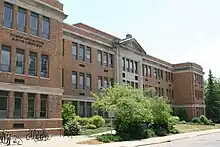
The Main Campus of the university is in Stevens Point, Wisconsin, a block north of State Route 66 and southwest of Interstate 39/U.S. Route 51. It is a 406-acre (164 ha) campus with 43 buildings, including a 280-acre (113 ha) nature preserve and 25-acre (10.1 ha) lake.
The Greek community on campus consists of four sororities and four fraternities. All the Greek organizations meet and collaborate as one, known as the Inter-Greek Council. The sororities on campus are Delta Phi Epsilon, Gamma Phi Delta Sorority, Phi Omega, and Sigma Delta Rho. The fraternities on campus are Phi Sigma Phi, Sigma Tau Gamma, Phi Mu Alpha Sinfonia, and Theta Xi.[17]
The Schmeeckle Reserve, a nature reserve, is on campus.
Housed within the Chemistry Biology Building is a Tropical Conservatory which is home to 400 different species and cultivars from Central and South America, Africa, Asia and the Pacific islands.[18]
UW-Stevens Point also has two additional campuses. UW-Stevens Point at Wausau and UW-Stevens Point at Marshfield. The UW-Stevens Point at Marshfield campus was formed in 1963 and is 114-acres in a quiet residential area. The UW-Stevens Point at Wausau campus was formed in 1933 and is located in an urban area.[19]
Satellite locations
The university has three off-site field stations: Central Wisconsin Environmental Station (CWES) at Amherst Junction, Treehaven near Tomahawk, and the Northern Aquaculture Demonstration Facility at Bayfield. CWES is on 200 acres near Sunset Lake, 17 miles east of Stevens Point. Treehaven is between Tomahawk and Rhinelander, Wisconsin on 1,400 acres. The Northern Aquaculture Demonstration Facility is at 36445 State Highway 13, 1.5 miles west of Red Cliff on Highway 13, near Lake Superior.[20][21]
Old Main
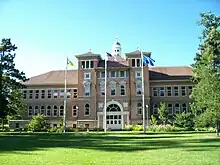
The iconic cupola atop the "Old Main" building is the current logo for the university.[22] Built in 1894, it was the first building on campus.[23] It was designed by Dwight H. Perkins of Perkins and Selby of Chicago in the Renaissance Revival Style, and is listed on the National Register of Historic Places.[23][24] It currently houses University Administration. [25]
In 1901, a west wing was added to the building to house home economics, the Rural Education Department, and the Music Department. In 1914, an east wing was added to the building to relocate home economics.[23]
Saving Old Main
In 1971, the University's Bureau of Facilities Management deemed Old Main as "obsolete". There were multiple efforts to save the building from demolition, including listing Old Main on the National Register of Historic Places in 1976. In 1979 the University was awarded funds to modernize the interior and remove both the east and west wings, thus saving Old Main. A formal rededication was held in October of 1980.[23]
Nelson Hall
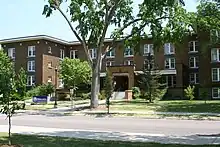
Nelson Hall is the second oldest building on campus. Built in 1915 and designed by the Milwaukee firm of Henry Van Ryn and Gerrit de Gellecke, it is listed on the National Register of Historic Places. Since it was built, the residence has housed women students, the Student Army Training Corps organizing for World War I, trainees for World War II and the ROTC. [26]
Nelson Hall is named for George B. Nelson who, at the time, was a regent of the State Normal School System. Nelson fought with legislators who were opposed to spending the $100,000 to build the hall.[26]
Museums
The UW-Stevens Point campus is home to the Museum of Natural History. The earliest mention of a museum at UWSP goes back to the founding of the campus and the construction of the Normal School Old Main Building in 1894. Currently, the museum is divided into 10 areas of natural history: Anthropology, Botany, Entomology, Geology, Herpetology, Ichthyology, Mammalogy, Ornithology, Parasitology, and Paleontology. A Noteworthy specimen includes the only Wisconsin fossil of the extinct elk-moose (Cervalces scotii) found by a farmer in Bevent. [27]
Many of UW-Stevens Point's collections are among the most heavily utilized teaching and research collections in the state.[28][29]
The campus also holds the Edna Carlsten Art Gallery which exhibits local, national, and international artists, hosts community events, and contributes to overseeing and maintaining a unique permanent collection of fine art and design works.[30]
Native American History
The UW-Stevens Point campus was built atop a Native American Burial Site. Recently, historic research showed the campus encompasses what was at one point a Native American camp and burial ground of the Ho-Chunk, Menominee, Ojibwe and Potawatomi. In the 1860s, scarlet fever devastated a diverse group of Native Americans who were living outside of Stevens Point after being forced out of their ancestral homelands by settlement. The deceased were buried on this site. [31] A mural was dedicated on May 5th, 2023 for a mural that memorializes Native Americans buried on campus and the annual Pow Wow. [32]
Student Life
UW-Stevens Point is home to 13 residence halls which are divided into 3 quads. The first quad established at the University was the Allen Quad, which consists of May Roach, Pray-Sims, Smith, and Hyer Halls, as well as the "Suites@201". The Allen Fitness center is located on the Allen quad and originally served as the University's first dining hall. As one of the fitness centers on campus, it houses strength training and cardiovascular equipment. The Allen quad has two halls which are unavailable to Freshman: the "Suites@201" and Hyer Hall. The "Suites@201" is an apartment-style residence hall that provides an off-campus apartment feel with on-campus amenities. Hyer Hall is available to students who are 21 years of age or older prior to the start of the fall semester.[33]
North DeBot Quad consists of Burroughs, Knutzen, Thomson, and Watson Halls. South DeBot Quad consists of Baldwin, Hansen, Neale, and Steiner Halls. The North DeBot and South DeBot quads are divided by the DeBot Dining Center which serves as the main dining center on campus. [33]
Media
Radio station
WWSP-FM is the University of Wisconsin–Stevens Point's alternative radio station. Operating at 30,000 watts, WWSP broadcasts commercial free on 89.9FM 24/7/365. '90FM' is the largest student-run radio station in the Midwest and hosts the world's largest trivia contest,[34] which was founded in 1969 and has since become a tradition for the university and the community.
Athletics
Student athletes in 20 sports at UW-Stevens Point participate in the NCAA Division III. The teams are members of the Wisconsin Intercollegiate Athletic Conference (WIAC).
Notable alumni
- Andrea Anders, television actress
- Mark E. Anderson, U.S. National Guard Major General
- Margaret Ashmun, teacher and writer
- Jenny Baeseman, polar researcher
- James Baumgart, politician
- Kirk Baumgartner, football player
- Tim Bedore, comedian
- Kathi Bennett, women's head basketball coach
- Bob Bostad, football coach
- Carlos Castillo-Chavez, professor of mathematics and biology
- Arthur J. Crowns, politician
- Steven E. Day, U.S. Coast Guard Rear Admiral
- Michael Dombeck, former U.S. Forest Service Chief
- Lawrence Eagleburger, former U.S. Secretary of State (attended)
- R. Michael Ferrall, politician
- J. P. Feyereisen, baseball player
- Ted Fritsch, football player
- Arnold Gesell, American psychologist
- Herbert J. Grover, educator and politician
- William C. Hansen, educator and politician
- David Helbach, politician
- Brian Idalski, Olympic ice hockey coach
- Kathy Kinney, television actress
- Dale Klapmeier, Cirrus Aircraft co-founder and former CEO
- Greg Koch, guitarist
- Anton C. Krembs, politician
- Clint Kriewaldt, football player
- Melvin Laird, former U.S. Secretary of Defense (attended)
- Henry Leck, choral clinician and professor of music
- John A. List, economist
- Edwin A. Loberg, U.S. Air Force Officer
- Max Maxfield, politician
- Scott May, baseball player
- Pete McCann, guitarist
- Mark Michie, U.S. National Guard Brigadier General
- Scott D. Berrier, U.S. Army Lieutenant General
- Lewis T. Mittness, politician
- H. J. Mortensen, politician
- William Murat, politician
- Michael P. Nelson, professor of environmental philosophy and ethics
- John M. Noel, entrepreneur and philanthropist
- Laura Osnes, actress
- Jim Pekol, musician
- Terry Porter, basketball player and coach
- Ryan Ramczyk, football player
- Bary Rose, football player
- Patrick Rothfuss, author
- Lolita Schneiders, politician
- Donna J. Seidel, politician
- Albert D. Shimek, politician
- Brad Soderberg, men's head basketball coach
- Mary Lou E. Van Dreel, politician
- Daniel P. Vrakas, politician
- Jordan Zimmermann, baseball player
Notable faculty
- Dick Bennett (athletics department, 1976–1985) – head basketball coach; later coached at the University of Wisconsin and Washington State University
- J. Baird Callicott (philosophy department, 1965–1994) – Distinguished Research Professor at the University of North Texas; co-founder of the academic environmental philosophy and ethics discipline
- Louie Crew – English professor at Rutgers University
- George Corneal – basketball, track and football coach
- Lee Sherman Dreyfus (Chancellor, 1967–1978) became the 40th Governor of Wisconsin
- Eddie Kotal – head football, basketball, track and field, and boxing coach; former NFL player
- Michael P. Nelson (philosophy department, 1992–2004) – environmental philosophy and ethics professor at Oregon State University; co-founder and director of the Conservation Ethics Group
- Helen Parkhurst (Director of the Department for the Training of Primary Teachers, 1913–1915) – Originator of the Dalton Plan. She is known as "one of only 100 great educators for all time," with her name being among Socrates and Maria Montessori.[36]
- Benjamin Percy – writer of short stories, essays, comics, and screenplays
- Patrick Rothfuss – writer of epic fantasy; books include The Name of the Wind, which won the 2007 Quill Award, and its sequel, The Wise Man's Fear, which topped The New York Times Best Seller list
References
- "Standards - Web Development | UWSP". Uwsp.edu. Retrieved 2015-12-17.
- "Our Campuses". University of Wisconsin-Stevens Point. Retrieved 2023-05-09.
- "Homepage". University of Wisconsin-Stevens Point. Retrieved 2023-05-26.
- "Academics". University of Wisconsin-Stevens Point. Retrieved 2023-05-26.
- "2100 MAIN ST | Property Record". Wisconsin Historical Society. 2012-01-01. Retrieved 2023-05-26.
- "University of Wisconsin – Stevens Point", Malcolm Rosholt Online Archives, Portage County Historical Society, retrieved June 11, 2014.
- "UWSP Timeline, 1893-1996 - Full view - UWDC - UW-Madison Libraries". search.library.wisc.edu. Retrieved 2023-08-01.
- "Former UW-Point president Hansen dies", Marshfield News-Herald (August 3, 1983), p. 15.
- "UWSP Timeline, 1893-1996 - Full view - UWDC - UW-Madison Libraries". search.library.wisc.edu. Retrieved 2023-05-27.
- Ashley Gatz, "UWSP chancellor announces resignation", WAOW, April 23, 2009.
- "'Polarizing' Chancellor at U. of Wisconsin-Stevens Point Quits After Hit-and-Run Incident", Chronicle of Higher Education, April 23, 2009.
- "UW-Stevens Point Chancellor Bernie Patterson to retire at year end". www3.uwsp.edu. Retrieved 2023-05-26.
- "Home - Chancellor's Office | UWSP". www3.uwsp.edu. Retrieved 2023-05-26.
- "TODAY IN SPORTS HISTORY: Jacksonville Jaguars open training camp at UW-Stevens Point in 1995; etc". Wiscnews.com. 2020-07-10. Retrieved 2023-08-01.
- "Academics". University of Wisconsin-Stevens Point. Retrieved 2023-08-01.
- "Graduate Students". University of Wisconsin-Stevens Point. Retrieved 2023-08-01.
- "Fraternity and Sorority Life". University of Wisconsin-Stevens Point. Retrieved 2023-06-13.
- "Tropical Conservatory". University of Wisconsin-Stevens Point. Retrieved 2023-05-09.
- "Our Campuses". University of Wisconsin-Stevens Point. Retrieved 2023-06-13.
- "Facilities - College of Natural Resources | UWSP". www3.uwsp.edu. Retrieved 2023-06-13.
- "Northern Aquaculture Demonstration Facility". University of Wisconsin-Stevens Point. Retrieved 2023-06-13.
- "The Cupola Post". give.uwsp.edu. Retrieved 2023-08-01.
- A History of Old Main. uwsp.edu. Retrieved 2023-08-01
- "Wisconsin SP Stevens Point State Normal School".
- "Home - Chancellor's Office | UWSP". www3.uwsp.edu. Retrieved 2023-08-01.
- "[PDF] A History of Nelson Hall - Free Download PDF". nanopdf.com. Retrieved 2023-05-09.
- "History of the Museum - Museum of Natural History | UWSP". www3.uwsp.edu. Retrieved 2023-05-09.
- "Mammalogy - Museum of Natural History | UWSP". www3.uwsp.edu. Retrieved 2023-07-09.
- "Ornithology - Museum of Natural History | UWSP". www3.uwsp.edu. Retrieved 2023-07-09.
- "Carlsten Art Gallery - Department of Art and Design | UWSP". www3.uwsp.edu. Retrieved 2023-05-09.
- "UW-Stevens Point marker to honor Indigenous burial grounds". www3.uwsp.edu. Retrieved 2023-05-09.
- "Native American mural dedication, Pow Wow planned at UW-Stevens Point". University of Wisconsin-Stevens Point. Retrieved 2023-05-09.
- "Residence Halls". University of Wisconsin-Stevens Point. Retrieved 2023-08-01.
- 90FM Trivia - The World's Largest Trivia Contest – Travel Wisconsin
- "Stevie Pointer". University of Wisconsin - Stevens Point Athletics. Retrieved 2023-05-27.
- Parkhurst, Helen. Biographical Vertical Files. Nelis R. Kampenga University Archives. University of Wisconsin-Stevens Point.